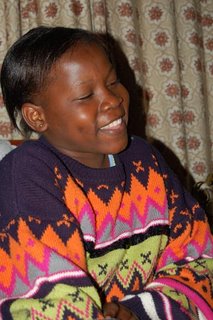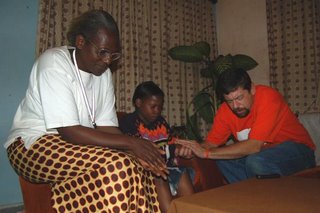In the southern Katanga Province, in or near cities such as Lubumbashi, Kipushi, and Kolwezi, World Vision is assisting large numbers of orphans and vulnerable children. As the killer pandemic of AIDS strikes and divides families, so many children lose one or both parents. Typically they are "adopted" by extended family members, but the stress of AIDS on a society already devastated by war and economic catastrophe makes the challenge especially difficult for these families who are now caring for the children of their deceased relatives.
"HopeChild" support provided by our donors is assisting in meeting the needs of orphans and vulnerable children. The latter may not have lost parents, but they nonetheless have special levels of critical need in an impoverished society, due to a debilitating illness such as AIDS.
In addition to HIV, there are also a number of other serious illnesses which can make a child vulnerable. Diabetes and sickle cell anemia are common examples of illnesses which affect children in the Democratic Republic of Congo (DRC).
 Felicite Nzabandora is one such vulnerable child, due to a 15-year fight with diabetes. Felicite's surname means "I will see" ... which is sadly ironic, as Felicite is in the process of losing her eyesight. She also has other complications resulting from her battle with a disease which might be relatively easy to control in places where access to medical care is taken for granted; but here in the Congo, in Felicite's home town of Kolwesi, such a disease can and often does create early childhood mortality.
Felicite Nzabandora is one such vulnerable child, due to a 15-year fight with diabetes. Felicite's surname means "I will see" ... which is sadly ironic, as Felicite is in the process of losing her eyesight. She also has other complications resulting from her battle with a disease which might be relatively easy to control in places where access to medical care is taken for granted; but here in the Congo, in Felicite's home town of Kolwesi, such a disease can and often does create early childhood mortality.But her first name, "Felicite," means "Joy," and World Vision is working with the Nzabandora family to try and create a hope for a brighter future and a reason for joy for Felicite. Though she has recently turned 18, her small frame and childlike face could easily be mistaken for a child four years younger. In addition to struggles with her eyesight, she also experiences pain and circulation problems in her hands due to the disease.
Felicite is the sixth in a family of seven children, but even her younger sister is a head taller and looks older than she. Her father, Joseph, is a civil engineer, and her mother, Agnes, is a registered nurse ... which is good fortune for Felicitee, since Agnes takes such an active role in trying to ensure her good health in the face of such a debilitating disease. Agnes ensures that Felicite faithfully takes her daily injections of insulin, provided by World Vision, which has helped to arrest the negative progress of the disease.
However, unlike a country such as the U.S. where blood sugar testing tools are readily available and affordable, and diabetics can therefore test their need for insulin several times each day -- enabling them a finer level of control in their administration of the important but dangerous substance -- unfortunately, in the Congo, the only place where blood sugar testing can be done is in a medical clinic or hospital. So Felicitee is only able to get her blood sugar tested occasionally, when World Vision takes her to a nearby clinic for checkups.
In addition, Felicite is now in need of surgery to remove the cataracts which have developed in her eyes. She was forced to suspend her schooling because of her inability to read due to the deterioration in her eyesight.
“I cannot see properly," Felicite explains. "And it is very difficult for me to make a fist. I cannot go to school and it is painful for me. When I see other children going to school, I am really sad. I wish I could also join them, but ….” and she begins to cry.
After she is able to speak again, Felicite says her career goal is to become a medical doctor, so she can help other children who are suffering with diseases such as diabetes.
When asked if she has other friends who struggle with diabetes, Felicite nods her head but remains silent for a moment. Then she explains, through her tears: "All my colleagues suffering from diabetes have already died." At one time, her mother explains, she had four friends suffering from the disease. But each has since died of complications. "I am now alone," Felicite says sadly.
In addition to her health care and medicines, World Vision is also providing food assistance to Felicite and her large family, in the form of milk, rice, potatoes, biscuits, and apples.
 I had the privilege of praying for Felicite and her mother, Agnes, during our time together. Please join me in praying for a full recovery of her eyesight and use of her hands.
I had the privilege of praying for Felicite and her mother, Agnes, during our time together. Please join me in praying for a full recovery of her eyesight and use of her hands.

4 comments:
Dear Larry,
Very interesting and much like where I work in the middle of the continent...the geographic middle! A forgotten country called the Central African Republic. I have been to the World Vision Office twice begging for help but this small country really is very small in comparison to the enormous needs that are on the continent. We are thrilled that we are able to work in this country caring for orphans, teach about AIDS and drilling water wells for the small villages with no hope. If you ever get a chance come and see this great country were the greatest Eland hunting in the world exists today but the people have absolultely nothing after 4 civil wars since 1995.
Sincerely seeking more help
Jim Hocking
www.icdinternational.org
Jim, thanks for your note. I feel your pain! My sense was much the same when I was in the DRC ... the needs are so much larger than our capacity to meet them.
I know that World Vision loves to partner with various ministry organizations on the ground in the different places we work, so my hope and prayer would be that your ministry and ours would find ways to work together. Ecclesiastes asserts that three strands are much tougher than one!
I spoke with our regional office in that part of Africa and they said that, unfortunately, we don't yet have an office in the Central African Republic.
- Larry
Yes , I will pray .
Thank you ,
Brooke
Yes ,
I will pray . God bless your efforts . Thanks ,
Brooke
Post a Comment